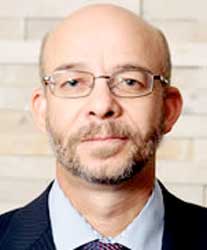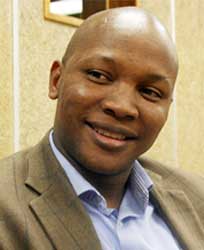Former Vodacom Chief Executive Alan Knott-Craig's claim to have invented the "Please Call Me" product while chatting to a colleague at work was deemed implausible by the High Court in Johannesburg.

Judge Phillip Coppin dismissed the Please Call Me case as it had been lodged too late. Image:
Pitje ChambersJudge Phillip Coppin expressed concerns about his evidence as the court dismissed a bid by former Vodacom employee Nkosana Makate to have the firm ordered to enter into negotiations with him over payment for the "Please Call Me" idea, which he claimed was his brainchild.
Judge Coppin found the product clearly did not occur by chance as Knott-Craig's 2009 book asserted.
In the book, A Second is Nothing, co-author Eunice Afonso described the claimed epiphany: "Alan was leaning over the railing of the Vodacom building chatting to a colleague, Phil Geissler, when Phil pointed out one security guard trying to attract another's attention, and his buddy didn't see him, and because his buddy didn't see him, the security guard called him on his cellphone. Alan immediately spoke to (Chief Financial Officer) Leon Crouse about creating a Please Call Me service."
Knott-Craig "not frank and honest" about Makate
The judge said the book's version was implausible and Knott-Craig, an intelligent person and qualified engineer, had great difficulty explaining it rationally.
"In my view, Knott-Craig was not frank and honest about his knowledge about Makate and his idea and its link to the 'Please Call Me' product," Judge Coppin said.
He nevertheless dismissed Makate's claim with costs as his application was lodged too late.

Nkosana Makate says he will appeal the court's decision as he believes he should be paid for he says was his Please Call Me idea. Image:
Wits VuvuzelaIn November 2000 Makate, then an employee at Vodacom had an idea that cellular network usage could be increased if customers with airtime could be induced to call back those without airtime. Makate wanted to be paid for his idea, and claims that Geissler, the Director of Product Development at Vodacom, concluded a verbal agreement with him for such payment.
This was despite Vodacom's policy to not compensate employees for their ideas above the normal remuneration they were paid.
Promise to pay denied
In the case, which was heard last year, Makate sought a declaratory order that the oral agreement was entered into by the parties and for an order directing Vodacom to begin negotiations to determine a reasonable settlement payable to him for the use of the concept.
Makate claimed that Vodacom had actual or ostensible authority to promise payment.
Vodacom denied this. Vodacom also denied Makate's claim that Geissler promised him, subject to certain conditions, a share of the revenue generated by his idea.
Judge Coppin said on the evidence, Makate had proven on a balance of probabilities that he had entered into an agreement with Geissler. However, he said, it was not proven that Vodacom was bound by the agreement that Makate concluded with Geissler.
Speaking outside the court, Makate said he would appeal the court's findings. Vodacom said it would comment after reading the judgment.
Source: Business Day via I-Net Bridge









































